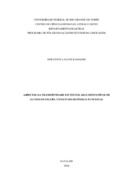Use este identificador para citar ou linkar para este item:
https://repositorio.ufrn.br/handle/123456789/22365| Título: | Aspectos da transitividade em textos argumentativos de alunos de inglês: um estudo sistêmico-funcional |
| Autor(es): | Ramalho, Heryzânya Alves |
| Orientador: | Cooper, Jennifer Sarah |
| Palavras-chave: | Transitividade;Escolhas léxico-gramaticais;Discussions;Linguística sistêmico-funcional |
| Data do documento: | 9-Dez-2016 |
| Referência: | RAMALHO, Heryzânya Alves. Aspectos da transitividade em textos argumentativos de alunos de inglês: um estudo sistêmico-funcional. 2016. 124f. Dissertação (Mestrado em Estudos da Linguagem) - Centro de Ciências Humanas, Letras e Artes, Universidade Federal do Rio Grande do Norte, Natal, 2016. |
| Resumo: | Este estudo qualiquantitativo se propõe a analisar escolhas léxico-gramaticais realizadas em 18 textos escritos do gênero Discussion produzidos por nove alunos de um instituto de idiomas pertencente a uma universidade federal no nordeste do Brasil. Os textos foram gerados em uma turma de inglês nível IV e em uma turma de conversação em dois momentos no decorrer de 2015.2 e submetidos à análise qualitativa por meio do sistema de transitividade proposto pela linguística sistêmico-funcional (HALLIDAY, 1994; EGGINS, 2004; HALLIDAY; MATTHIESSEN, 2014). Na análise quantitativa, utilizou-se a ferramenta Wordsmith Tools 5.0 (SCOTT, 2010) para identificar e quantificar os processos e os participantes das orações. Os resultados mostram que os processos mais usados na turma de nível IV foram is/are, like e have enquanto os processos mais recorrentes na turma de conversação foram is/are, think e do. Na primeira turma, o processo like sugere que os alunos concebem os assuntos tratados como questões de preferência pessoal enquanto, na segunda turma, o processo think revela a interpretação dos temas como questões de crenças pessoais. Quanto aos participantes nas orações, as maiores recorrências da turma de nível IV foram people, weekend, I e we, enquanto we, waste, problem, garbage, you e women foram mais recorrentes na turma de conversação. O uso recorrente de I na primeira turma mostra a estratégia dos alunos de se revelarem como autores a fim de expressarem sua opinião. Por outro lado, na segunda turma, o uso de you consiste numa estratégia para chamar a atenção do leitor diretamente. Tais resultados mostram que a identificação e a análise dos participantes e dos processos nas orações por meio da transitividade são feedback útil para os alunos, seja na reescrita ou na produção de novos textos. |
| Abstract: | This qualiquantitative study analyzes lexicogrammatical choices realized in 18 written texts from the Discussion genre produced by nine students of a language institute at a federal university in Northeastern Brazil. The texts were generated in a Level IV English class and in a conversation class in two moments in 2015.2 and submitted to a qualitative analysis by using the transitivity system proposed by systemic-functional linguistics (HALLIDAY, 1994; EGGINS, 2004; HALLIDAY; MATTHIESSEN, 2014). In the quantitative analysis, we used the Wordsmith Tools 5.0 (SCOTT, 2010) program to identify and quantify the processes and the participants of the clauses. The results show that the most frequent processes in the level IV class were is/are, like and have whereas the most frequent processes in the conversation class were is/are, think, and do. In the first class, the process like suggests that the students conceive the subjects in question as matters of personal preference while, in the second class, the process think reveals the interpretation of the themes as matters of personal beliefs. Regarding the participants in the clauses, the more frequent recurrences in the level IV class were people, weekend, I and we, while we, waste, problem, garbage, you and women were more recurrent in the conversation class. The recurrent use of I in the first class shows the strategy of the students in revealing themselves as authors to express their opinions. On the other hand, in the second class, the use of you consists of a strategy to call the reader’s attention directly. These results show that the identification and the analysis of participants and processes in the clauses by means of transitivity are useful feedback for the students when rewriting or producing new texts. |
| URI: | https://repositorio.ufrn.br/jspui/handle/123456789/22365 |
| Aparece nas coleções: | PPGEL - Mestrado em Estudos da Linguagem |
Arquivos associados a este item:
| Arquivo | Descrição | Tamanho | Formato | |
|---|---|---|---|---|
| HeryzanyaAlvesRamalho_DISSERT.pdf | 1,76 MB | Adobe PDF |  Visualizar/Abrir |
Os itens no repositório estão protegidos por copyright, com todos os direitos reservados, salvo quando é indicado o contrário.

